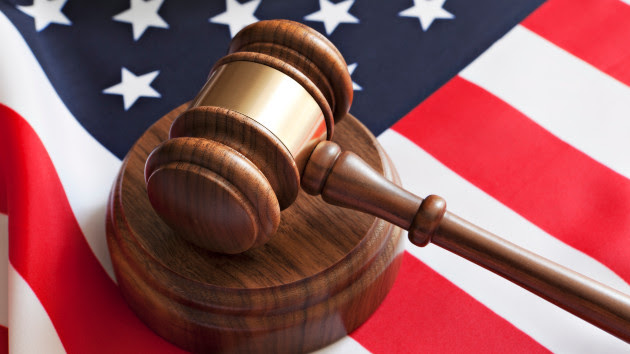(NEW YORK) — When Donald Trump first entered a Manhattan, New York courtroom last April for his arraignment on hush money charges, the moment was historic for the country and novel for the former president.
But in the year that followed, Trump faced four additional indictments and spent about three weeks in New York courtrooms to attend his civil trials — denying wrongdoing in each case. The unprecedented became the norm for a former president simultaneously fighting multiple criminal cases while vying for the presidency.
Trump plans to return to that same New York courtroom on Thursday for the final scheduled hearing before he goes to trial on March 25 for what prosecutors allege was “an expansive and corrupt criminal scheme” to conceal information from voters ahead of the 2016 election.
Manhattan District Attorney Alvin Bragg charged Trump with 34 felony counts of falsifying business records, alleging that Trump falsified Trump Organization records to hide payments he made to his former lawyer Michael Cohen, who allegedly used the money to kill stories about Trump’s long-denied extramarital affairs with Stormy Daniels and Karen McDougal just days before the 2016 election.
Trump pleaded not guilty to all charges and has denied all wrongdoing.
The judge overseeing the case, Juan Manuel Merchan, scheduled Thursday’s hearing late last year to resolve pretrial motions and finalize the trial date, which appears likely to be Trump’s first criminal trial this year.
Motion to dismiss
In October, Trump’s lawyers filed a motion to dismiss the charges by arguing that the case itself was politically motivated, that it interferes with the 2024 election, that it’s barred by the statute of limitations, and that it includes multiple technical defects.
“The pendency of these proceedings, and the manner in which they were initiated, calls into question the integrity of the criminal justice process, is inconsistent with bedrock due process principles, and is interfering with the campaign of the leading candidate in the 2024 presidential election,” Trump’s attorney Todd Blanche said in the motion.
Blanche argued that the payments to Cohen were lawful money transfers from Trump’s own personal bank accounts.
“President Trump cannot be said to have falsified business records of the Trump Organization by paying his personal attorney using his personal bank accounts,” Blanche wrote.
In response, prosecutors argued that Trump is asking for special treatment because he is running for president.
“Courts have repeatedly rejected defendant’s demands for special treatment and instead have adhered to the core principle that the rule of law applies equally to the powerful as to the powerless,” prosecutors wrote.
Meanwhile, in Georgia
As Trump attends the hearing in New York, a separate hearing in his Georgia election interference case is scheduled to take place in Atlanta.
Judge Scott McAfee, who is overseeing Fulton County District Attorney Fani Willis’ sprawling racketeering case against Trump and 18 co-defendants, has set a two-day hearing to hear motions on whether Willis should be disqualified from the case after multiple defendants accused her of benefiting financially from a personal relationship with a prosecutor she hired in the case. Willis has denied the allegation.
“I think it’s clear that disqualification can occur if evidence is produced demonstrating an actual conflict or the appearance of one,” Judge McAfee said during a Monday hearing. “The state has admitted a relationship existed. And so what remains to be proven is the existence and extent of any financial benefit, again if there even was one.”
Despite the high stakes in Georgia, Trump opted to attend the New York hearing instead of the Fulton County one. He is not required to attend either hearing, and can leave the hearing whenever he wants.
“President Trump will be attending court in New York on Thursday,” Trump’s attorney in Georgia, Steve Sadow, said in a statement Tuesday.
Trump’s trial calendar
Of Trump’s four criminal trials, only two currently have set trial dates. His New York trial is scheduled to begin March 25 and his federal classified documents case in Florida is scheduled to start on May 20, although that trial date appears unlikely to stick given the complexity of the case.
Trump’s federal election interference case in Washington, D.C. was initially scheduled to begin on March 4, but the proceedings have been frozen since December while Trump advances his appeal on the grounds of presidential immunity. Last week a three-judge panel in the U.S. Court of Appeals rejected Trump’s claim of presidential immunity as it pertains to the case, and on Monday Trump asked the Supreme Court to stay that decision in order to allow the appellate process to play out.
The Supreme Court is currently considering Trump’s application for an emergency stay of the proceedings.
If or when the federal election case resumes, U.S. District Judge Tanya Chutkan would likely need to give the parties at least two months to prepare for a trial, according to NYU Law Professor Richard Pildes.
With that case stalled, Judge Merchan in New York appears positioned to oversee Trump’s first criminal trial and has already begun communicating with the parties about the jury selection process.
Copyright © 2024, ABC Audio. All rights reserved.












